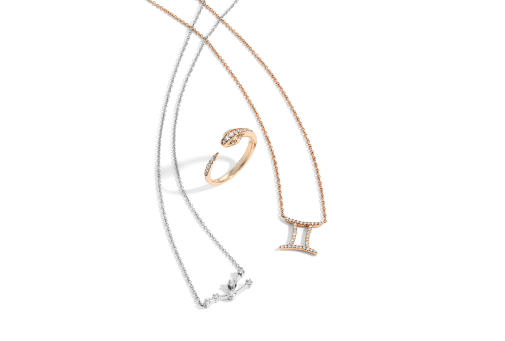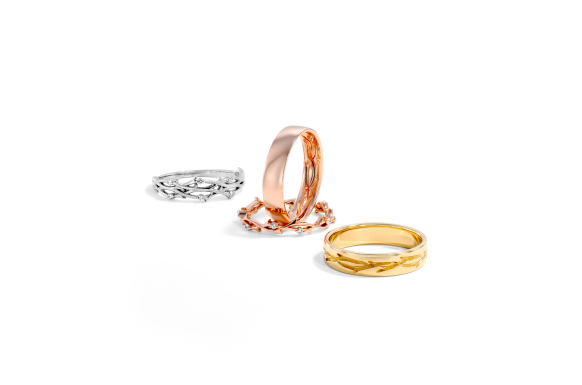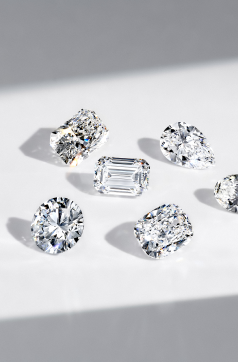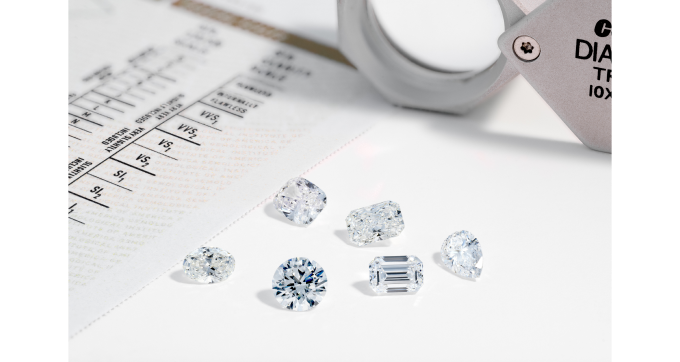Quick Summary
Natural diamonds can be ethical when sourced responsibly, thanks to certification systems like the Kimberley Process. Today's ethical natural diamonds come with proper documentation, support fair labor practices, and contribute to economic development in mining communities. You can verify a diamond's ethical status by asking for Kimberley Process certification, requesting supply chain documentation, and choosing retailers with transparent sourcing practices. Both natural and lab-grown diamonds offer ethical advantages - mined diamonds support developing economies while lab-grown diamonds eliminate mining concerns entirely. The key to buying an ethical engagement ring lies in research, asking the right questions, and choosing reputable retailers who prioritize transparency and responsible sourcing.
When you’re planning to propose, you want everything to be perfect, including your diamond choice. This is why the question "are natural diamonds ethical?" has become increasingly important to couples who want their symbol of love to reflect their values.
The natural diamond industry faced serious ethical challenges in the past, with issues ranging from conflict diamonds funding wars to poor labor conditions in mining communities. These controversies sparked global conversations about responsible sourcing and led to major changes in how mined diamonds reach your jewelry box. This guide will cover the key issues, how certification systems like the Kimberley Process work, and what makes a mined diamond truly ethical in today's market.
Understanding Diamond Ethics: The Key Issues
Conflict diamonds are the most well-known ethical concern in the natural diamond industry. Also called "blood diamonds," they once funded armed conflicts in several African countries. Today, conflict diamonds make up less than 1% of the global trade, thanks to international certification systems and improved monitoring of diamond mines.
Environmental impact concerns center around how mining affects the land and surrounding ecosystems. Responsible diamond companies now implement land restoration programs, protect local wildlife habitats, and minimize water usage during extraction. After mining concludes, these companies restore the land for agricultural use or convert it into nature reserves.
Labor practices have also changed dramatically since the early days of the mining industry. Modern ethical diamond operations avoid child labor and provide fair wages, safe working conditions, and healthcare benefits to their employees. This means you can now find diamonds that actively support the livelihoods of local communities rather than exploit them.
What is the Kimberley Process?
The Kimberley Process Certification Scheme emerged in 2003 as the international response to blood diamonds flooding the market. This certification system brings together governments, diamond producers, and civil society organizations to prevent conflict diamonds from entering the legitimate trade. The system requires participating countries to certify that their diamond exports are conflict-free and to implement strict controls on their supply chain.
The certification system operates through a network of government-issued certificates that accompany rough diamonds across international borders. "Countries in the scheme only trade with each other, which stops non-certified diamonds from entering legal markets. The system, which includes small-scale and artisanal miners, covers 82 countries representing 99.8% of global rough diamond production.
The Kimberley Process has achieved remarkable success in reducing conflict diamonds in the global market. Before its implementation, conflict diamonds represented approximately 15% of the diamond trade. Today, that figure has dropped to less than 1%. This dramatic reduction means you can purchase natural diamonds with much greater confidence than consumers could two decades ago.
What Makes a Natural Diamond Ethical Today?
You can identify ethical mined diamonds by looking for certain characteristics. To begin with, your diamond should come with proper Kimberley Process certification. Canadian diamonds often come with the Canadian Diamond Code of Conduct, which includes strict labor and environmental standards. Responsible Jewelry Council certification indicates that companies have been audited for ethical business practices throughout their operations. Some retailers also participate in industry initiatives like the Natural Diamond Council and Diamond Development Initiative or maintain their own ethical sourcing standards.
Be cautious of retailers who can't provide clear documentation about their diamond origins. Prices that seem too good to be true often indicate corners have been cut somewhere in the supply chain. Lack of third-party certifications, vague statements about ethical sourcing, and unwillingness to provide detailed paperwork should all raise concerns about a diamond's true ethical status.
Lab-Grown Diamonds vs. Natural Diamonds: An Ethical Comparison
You have two main options when seeking an ethically sourced diamond: lab-grown diamonds and responsibly sourced natural diamonds. Both choices offer ethical advantages, but they address different concerns and support different values.
Lab-grown diamonds eliminate traditional environmental concerns associated with diamond mining by creating stones in controlled laboratory environments. These diamonds, which have the same chemical composition as their natural counterparts, require no mining operations, which means they avoid any potential labor issues, environmental disruption, or community displacement. Lab-grown diamonds are guaranteed conflict-free because they're created in facilities with full transparency and oversight. The production takes place in developed countries with strong labor protections and environmental regulations.
Natural diamonds from ethical sources provide different but equally important benefits. Responsible natural diamond mining creates jobs in developing countries where employment opportunities may be limited. When you choose ethically sourced diamonds, you're supporting economic opportunities for communities in Africa, Canada, Australia, and other diamond-producing regions. Countries like Botswana and Sierra Leone have transformed their economies and improved living standards for millions of citizens through responsible diamond mining revenues.
Keyzar's Commitment to Ethical Diamond Sourcing
Keyzar maintains strict ethical sourcing standards. All natural diamond engagement rings and jewelry we sell come with complete Kimberley Process certification, and we require suppliers to provide detailed information about their mining operations, labor practices, and community benefit programs. Keyzar also maintains records showing the complete supply chain for each diamond, from mine to finished jewelry.
Customer transparency is one of our core values. Our website includes information about our sourcing standards and supplier requirements. Our customer service team can also answer questions about ethical sourcing and thoroughly explain our standards and verification methods.
Keyzar also offers lab-grown diamond options for customers who prefer this environmentally friendly alternative. Our lab-grown diamonds come from certified facilities that use renewable energy, avoid water pollution and maintain excellent labor practices. Whether you choose a natural or lab-grown diamond for your engagement ring, Keyzar ensures your purchase reflects your ethical values and quality expectations.
So Are Natural Diamonds Ethical?
Mined diamonds can absolutely be ethical when they come from responsible sources. The natural diamond industry has transformed dramatically over the past two decades, with strong certification systems and oversight that ensures ethical practices throughout the supply chain.
lab-grown diamonds depends on your budget and personal preferences. The key lies in asking the right questions and choosing retailers like Keyzar who prioritize ethical sourcing and fair trade. With proper knowledge and careful selection, you can confidently choose a diamond that reflects both your love and your values.






